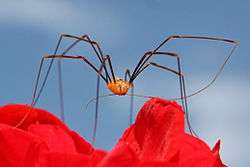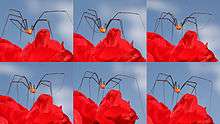Opilio canestrinii
Males reach a body length up to 6 mm, females up to 8 mm. While males are yellowish brown to reddish, females are lighter. Males have dark legs, but yellow coxae and "knees"; the legs of females show alternatingly light and dark rings. The backs of females sport a dark, saddle-like pattern with a light longitudinal stripe in the middle. Adults can be found from June to December.[1]
| Opilio canestrinii | |
|---|---|
 | |
| Male cleaning his legs | |
| Scientific classification | |
| Kingdom: | |
| Phylum: | |
| Class: | |
| Order: | |
| Suborder: | |
| Superfamily: | |
| Family: | |
| Subfamily: | Opilioninae |
| Genus: | |
| Species: | O. canestrinii |
| Binomial name | |
| Opilio canestrinii (Thorell, 1876) | |
| Synonyms | |
|
Phalangium canestrinii | |

male cleaning legs
Opilio canestrinii is a species of harvestman.
O. canestrinii probably originates from Italy, but has invaded Central Europe since the late 1970, and has since almost everywhere replaced the similar O. parietinus. It is most often found on house walls.[1]
References
- Bellmann, Heiko (1997): Kosmos-Atlas Spinnentiere Europas. Kosmos. ISBN 3-440-10746-9 (in German)
Further reading
- Joel Hallan's Biology Catalog: Phalangiidae
| Wikimedia Commons has media related to Opilio canestrinii. |
This article is issued from Wikipedia. The text is licensed under Creative Commons - Attribution - Sharealike. Additional terms may apply for the media files.